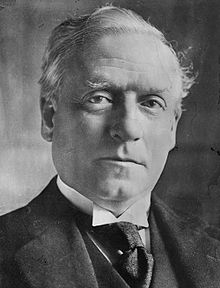
Back Herbert Henry Asquith Afrikaans هربرت أسكويث Arabic هربرت اسكويث ARZ Herbert Henri Askvit Azerbaijani Герберт Генры Эсквіт Byelorussian Гэрбэрт Гэнры Эсквіт BE-X-OLD Хърбърт Хенри Аскуит Bulgarian H.H. Asquith Catalan Herbert Henry Asquith Czech Herbert Henry Asquith Welsh
This article may be too long to read and navigate comfortably. When this tag was added, its readable prose size was 24000 words. (January 2024) |
The Earl of Oxford and Asquith | |||||||||||||||||||||||||||||||||||
|---|---|---|---|---|---|---|---|---|---|---|---|---|---|---|---|---|---|---|---|---|---|---|---|---|---|---|---|---|---|---|---|---|---|---|---|
 Asquith c. 1910s | |||||||||||||||||||||||||||||||||||
| Prime Minister of the United Kingdom | |||||||||||||||||||||||||||||||||||
| In office 5 April 1908 – 5 December 1916 | |||||||||||||||||||||||||||||||||||
| Monarchs | |||||||||||||||||||||||||||||||||||
| Preceded by | Henry Campbell-Bannerman | ||||||||||||||||||||||||||||||||||
| Succeeded by | David Lloyd George | ||||||||||||||||||||||||||||||||||
| Leader of the Opposition | |||||||||||||||||||||||||||||||||||
| In office 12 February 1920 – 21 November 1922 | |||||||||||||||||||||||||||||||||||
| Monarch | George V | ||||||||||||||||||||||||||||||||||
| Prime Minister |
| ||||||||||||||||||||||||||||||||||
| Preceded by | Donald Maclean | ||||||||||||||||||||||||||||||||||
| Succeeded by | Ramsay MacDonald | ||||||||||||||||||||||||||||||||||
| In office 6 December 1916 – 14 December 1918 | |||||||||||||||||||||||||||||||||||
| Monarch | George V | ||||||||||||||||||||||||||||||||||
| Prime Minister | David Lloyd George | ||||||||||||||||||||||||||||||||||
| Preceded by | Edward Carson | ||||||||||||||||||||||||||||||||||
| Succeeded by | Donald Maclean | ||||||||||||||||||||||||||||||||||
| Leader of the Liberal Party | |||||||||||||||||||||||||||||||||||
| In office 30 April 1908 – 14 October 1926 | |||||||||||||||||||||||||||||||||||
| Preceded by | Henry Campbell-Bannerman | ||||||||||||||||||||||||||||||||||
| Succeeded by | David Lloyd George | ||||||||||||||||||||||||||||||||||
| |||||||||||||||||||||||||||||||||||
| |||||||||||||||||||||||||||||||||||
| Personal details | |||||||||||||||||||||||||||||||||||
| Born | Herbert Asquith 12 September 1852 Morley, West Riding of Yorkshire, England | ||||||||||||||||||||||||||||||||||
| Died | 15 February 1928 (aged 75) Sutton Courtenay, Berkshire, England | ||||||||||||||||||||||||||||||||||
| Resting place | All Saints' Church, Sutton Courtenay | ||||||||||||||||||||||||||||||||||
| Political party | Liberal | ||||||||||||||||||||||||||||||||||
| Spouses |
| ||||||||||||||||||||||||||||||||||
| Children | 10, including Raymond, Herbert, Arthur, Violet, Cyril, Elizabeth and Anthony | ||||||||||||||||||||||||||||||||||
| Education | City of London School | ||||||||||||||||||||||||||||||||||
| Alma mater | |||||||||||||||||||||||||||||||||||
| Profession | Barrister | ||||||||||||||||||||||||||||||||||
| Signature |  | ||||||||||||||||||||||||||||||||||
Herbert Henry Asquith, 1st Earl of Oxford and Asquith, KG, PC, KC, FRS (12 September 1852 – 15 February 1928), generally known as H. H. Asquith, was a British politician and statesman who served as Prime Minister of the United Kingdom from 1908 to 1916. He was the last Liberal Party prime minister to command a majority government, and the most recent Liberal to have served as Leader of the Opposition. He played a major role in the design and passage of major liberal legislation and a reduction of the power of the House of Lords. In August 1914, Asquith took Great Britain and the British Empire into the First World War. During 1915, his government was vigorously attacked for a shortage of munitions and the failure of the Gallipoli Campaign. He formed a coalition government with other parties but failed to satisfy critics, was forced to resign in December 1916 and never regained power.
After attending Balliol College, Oxford, he became a successful barrister. In 1886, he was the Liberal candidate for East Fife, a seat he held for over thirty years. In 1892, he was appointed Home Secretary in Gladstone's fourth ministry, remaining in the post until the Liberals lost the 1895 election. In the decade of opposition that followed, Asquith became a major figure in the party, and when the Liberals regained power under Sir Henry Campbell-Bannerman in 1905, Asquith was named Chancellor of the Exchequer. In 1908, Asquith succeeded him as prime minister. The Liberals were determined to advance their reform agenda. An impediment to this was the House of Lords, which rejected the People's Budget of 1909. Meanwhile, the South Africa Act 1909 passed. Asquith called an election for January 1910, and the Liberals won, though they were reduced to a minority government. After another general election in December 1910, he gained passage of the Parliament Act 1911, allowing a bill three times passed by the Commons in consecutive sessions to be enacted regardless of the Lords. Asquith was less successful in dealing with Irish Home Rule. Repeated crises led to gun running and violence, verging on civil war.
When Britain declared war on Germany in response to the German invasion of Belgium, high-profile domestic conflicts were suspended regarding Ireland and women's suffrage. Asquith was more of a committee chair than a dynamic leader. He oversaw national mobilization, the dispatch of the British Expeditionary Force to the Western Front, the creation of a mass army, and the development of an industrial strategy designed to support the country's war aims. The war became bogged down and the demand rose for better leadership. He was forced to form a coalition with the Conservatives and Labour early in 1915. He was weakened by his own indecision over strategy, conscription, and financing.[1] Lloyd George replaced him as prime minister in December 1916. They became bitter enemies and fought for control of the fast-declining Liberal Party. His role in creating the modern British welfare state (1906–1911) has been celebrated, but his weaknesses as a war leader and as a party leader after 1914 have been highlighted by historians. He remained the only prime minister between 1827 and 1979 to serve more than eight consecutive years in a single term.
- ^ Cameron Hazelhurst, "Herbert Henry Asquith" in John P McIntosh, ed. British Prime Ministers in the 20th Century (1977) 105-6
© MMXXIII Rich X Search. We shall prevail. All rights reserved. Rich X Search